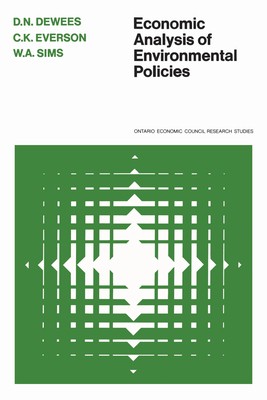
- We will send in 10–14 business days.
- Author: Donald N Dewees
- Publisher: University of Toronto Press
- ISBN-10: 0802033350
- ISBN-13: 9780802033352
- Format: 15.2 x 22.9 x 1.1 cm, minkšti viršeliai
- Language: English
- SAVE -10% with code: EXTRA
Reviews
Description
A framework is concisely presented for the economic analysis of pollution problems and for evaluating proposed solutions. The substantial recent literature on environmental economics is reviewed and related to Ontario environmental policy. Topics include the theory of externalities as an explanation of environmental problems, policy objectives, costs of information and monitoring, and the impact of these costs on control policy selection. Three case studies of specific pollution problems - sulphur dioxide from a smelter, lead from downtown factories, and urban automobile emissions - are given, and possible solutions explored.
The authors' methodology is applicable not only to air and water pollution but also to noise, aesthetic degradation, and solid waste. This study will be welcomed by specialists, civil servants, and students trying to understand the economic aspects of environmental maintenance.
EXTRA 10 % discount with code: EXTRA
The promotion ends in 23d.16:32:45
The discount code is valid when purchasing from 10 €. Discounts do not stack.
- Author: Donald N Dewees
- Publisher: University of Toronto Press
- ISBN-10: 0802033350
- ISBN-13: 9780802033352
- Format: 15.2 x 22.9 x 1.1 cm, minkšti viršeliai
- Language: English English
A framework is concisely presented for the economic analysis of pollution problems and for evaluating proposed solutions. The substantial recent literature on environmental economics is reviewed and related to Ontario environmental policy. Topics include the theory of externalities as an explanation of environmental problems, policy objectives, costs of information and monitoring, and the impact of these costs on control policy selection. Three case studies of specific pollution problems - sulphur dioxide from a smelter, lead from downtown factories, and urban automobile emissions - are given, and possible solutions explored.
The authors' methodology is applicable not only to air and water pollution but also to noise, aesthetic degradation, and solid waste. This study will be welcomed by specialists, civil servants, and students trying to understand the economic aspects of environmental maintenance.


Reviews